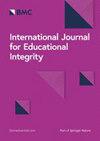抄袭后:人工智能和神经技术时代的跨学科伦理与诚信
IF 6.9
Q1 EDUCATION & EDUCATIONAL RESEARCH
International Journal for Educational Integrity
Pub Date : 2023-10-12
DOI:10.1007/s40979-023-00144-1
引用次数: 0
摘要
在本文中,我探讨了后抄袭的概念,它被粗略地定义为人类社会和文化的一个时代,在这个时代,人工智能和神经技术等先进技术,包括脑机接口(bci),成为生活的正常组成部分,包括我们日常的教学、学习、交流和互动。在技术无法与日常生活脱钩的后抄袭时代,道德和诚信尤为重要。我认为,当商业化的神经教育技术以一种可植入/可摄入/可嵌入和无形的形式随时可用时,学术诚信军备竞赛将结束,因为检测将是徒劳的。在后抄袭时代,在先进技术无法与教育或日常生活分离的情况下,人类被迫努力解决有关社会公正世界的道德和诚信问题。最后,我呼吁采取行动进行跨学科研究,以更好地理解先进技术在教育中的伦理影响,并强调这种研究可以被视为先发制人,而不是推测性的。无处不在的人工智能和神经技术(例如,脑机接口)在教育中的伦理意义在全球范围内都很重要,因为我们今天的学生正在为学业和终身成功做好准备。本文章由计算机程序翻译,如有差异,请以英文原文为准。
Postplagiarism: transdisciplinary ethics and integrity in the age of artificial intelligence and neurotechnology
Abstract In this article I explore the concept of postplagiarism, loosely defined as an era in human society and culture in which advanced technologies such as artificial intelligence and neurotechnology, including brain-computer interfaces (BCIs), become a normal part of life, including how we teach, learn, communicate, and interact on a daily basis. Ethics and integrity are intensely important in the postplagiarism era when technology cannot be decoupled from everyday life. I argue that it might be reasonable to assume that when commercialized neuro-educational technology is readily available in a form that is implantable/ingestible/embeddable and invisible then academic integrity arms race will be over, as detection will be an exercise in futility. In a postplagiarism era, humans are compelled to grapple with questions about ethics and integrity for a socially just world at a time when advanced technology cannot be unbundled from education or everyday life. I conclude with a call to action for transdisciplinary research to better understand ethical implications of advanced technologies in education, emphasizing that such research can be considered pre-emptive , rather than speculative . The ethical implications of ubiquitous artificial intelligence and neurotechnology (e.g., BCIs) in education are important at a global scale as we prepare today’s students for academic and lifelong success.
求助全文
通过发布文献求助,成功后即可免费获取论文全文。
去求助
来源期刊

International Journal for Educational Integrity
EDUCATION & EDUCATIONAL RESEARCH-
CiteScore
6.90
自引率
26.10%
发文量
25
审稿时长
22 weeks
 求助内容:
求助内容: 应助结果提醒方式:
应助结果提醒方式:


